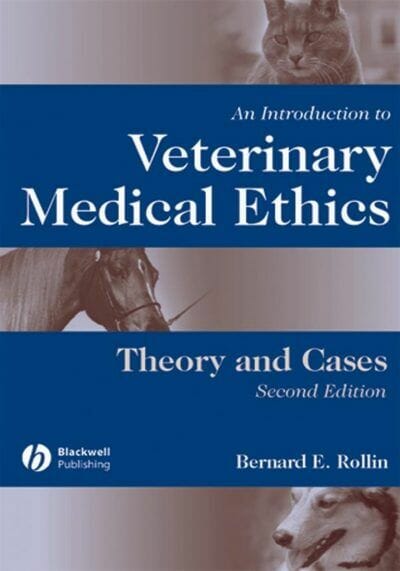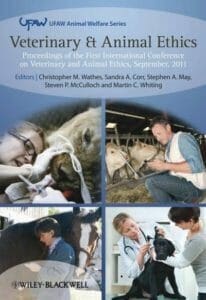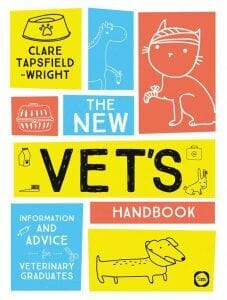Preface to the Second Edition.
Preface to the First Edition.
Part I. Theory.
Social, Personal, and Professional Ethics.
Ethics1 and Ethics2.
Ethical Vectors in Veterinary Medicine.
The Anatomy of Ethical Decision Making.
The Nature of Ethical Theory.
Effecting Ethical Change.
The Fundamental Question of Veterinary Ethics.
New Patterns of Animal Use.
Articulating a New Ethic for Animals.
Veterinarians and the New Social Ethic for Animals.
How Veterinary Medicine Should Respond to the New Ethic: The Case of Animal Research.
Veterinarians and Farm Animal Welfare.
Recent Progress.
Veterinarians and Companion Animal Welfare.
Subtle Advantages of Pursuing Companion Animal Welfare.
The Changing Role of Companion Animals and Their Value.
Pain in Veterinary (and Human) Scientific Medicine.
Animal Distress and Animal Happiness.
The Ethics of Critical Care.
Aesculapian Authority in Veterinary Medicine.
The Ethics of Alternative Medicine.
Part II. Cases.
Introduction.
Case 1. Cow with Cancer Eye.
Case 2. Substandard Husbandry for Sheep.
Case 3. Fracture Fixation.
Case 4. Farmer Using Illegal Growth Promotant.
Case 5. Client Sells Known BVD Shedders.
Case 6. Client Requests Dog Euthanasia Because She Is Moving.
Case 7. Farmer Requests a Fetotomy.
Case 8. Suspected Dogfighting.
Case 9. Docking and Cropping of Dobermans.
Case 10. Leaving a Sow Untreated.
Case 11. Euthanasia of Cat Who Sprays.
Case 12. Euthanasia of Treatable Horse for Insurance.
Case 13. Euthanasia of Grieving Dog.
Case 14. Supernumerary Teat Removal.
Case 15. Breeder Seeking Euthanasia for Puppy with Overbite.
Case 16. Veterinary Anatomist Spaying Farm Cats.
Case 17. Breeder Asking for Anesthetics So She Can Crop Ears.
Case 18. Penicillin Residue in Milk.
Case 19. Marketing Heartworm Regimen.
Case 20. Dairy Farmers Using Unauthorized Feed Additive Prescribed by a.
Veterinarian.
Case 21. Veterinarian’s Responsibility When a Dog Is Suspected to Be Overly Aggressive.
Case 22. Painful Research Designed without Analgesia.
Case 23. Clients Who Insist on Continuing Treatment for Failing Cancer Dog.
Case 24. Tail Docking in Dairy Cattle.
Case 25. Killing of Neonatal Buck Kids.
Case 26. Veterinarian Discovers Violations in Religious Slaughter.
Case 27. Using Information about Alternative Surgical Training in Hiring.
Case 28. Pig Farmer Asking for Euthanasia Solution.
Case 29. Feeding Kittens to Snakes.
Case 30. Veterinarian Seeking Maternity Leave.
Case 31. Surgical Procedures Performed by a Technician.
Case 32. Veterinary Liaison with Pet Store Chain Providing Poor Animal Care.
Case 33. Freeze-Firing Racehorses.
Case 34. Performing Cat Castration on the Farm.
Case 35. Irresponsible Veterinarian-Breeder.
Case 36. Annual Rabies Vaccination.
Case 37. Government Policy Regarding Export of Breeding Swine.
Case 38. Improperly Labeled Prescriptions Swallowed by Child.
Case 39. Referral Practice “Stealing” Clients.
Case 40. Confidentiality and a Breeder Perpetuating a Line of Dogs with Seizures.
Case 41. Should Veterinarians Be Required to Report Animal Abuse?.
Case 42. Two Cases of Found Dogs.
Case 43. Should a Biting Dog Be Adopted Out.
Case 44. Euthanizing Sick Animals without their Owner’s Permission.
Case 45. Partner’s Misdiagnosis.
Case 46. Heavy Metal Toxicosis and Slaughter for Food.
Case 47. Conflict of Interest.
Case 48. Rabies Vaccine for Livestock.
Case 49. Female Veterinarian Receiving Unwelcome Attention.
Case 50. Female Veterinarian Offended by Colleagues’ Humor.
Case 51. Client Refuses Euthanasia for Sick Cat.
Case 52. Should Veterinarians Prescribe Drugs to Increase Productivity?.
Case 53. Previous Practitioner Leaves Sponge in Dog’s Peritoneum.
Case 54. Illicit Importation of Boar Semen.
Case 55. Misreading of Radiograph.
Case 56. Cattery Serving as Source of FIP.
Case 57. Injured, Unowned Animal.
Case 58. Writing Prescriptions for Branded Drugs in Return for Financial.
Incentive.
Case 59. Negligence of an Emergency Clinician in Treating Trauma, xx.
Case 60. Poor Air Quality in Swine Barn.
Case 61. Supplementing Income with Prescription Drugs.
Case 62. Client’s Request to Euthanize His Dog after His Death.
Case 63. Confidentiality and an Employee’s History of Drug Abuse.
Case 64. Convenience Euthanasia of a Dog without Proper Permission.
Case 65. Veterinarian Who Ignores Roundworms in Puppies.
Case 66. Stray Tattooed Beagle.
Case 67. Prescribing and Selling Pharmaceuticals.
Case 68. Suspected Poisoning.
Case 69. Euthanasia of Research Animal without Researcher’s Permission.
Case 70. Anorexic Client Not Feeding Her Dog.
Case 71. Improving Rural Euthanasia.
Case 72. Second Commentary on Stray Tattooed Beagle.
Case 73. Bull Mastiff with Osteosarcoma.
Case 74. Financially Stressed Client and Annual Physical.
Case 75. Botched Caesarean Section.
Case 76. Farmer Asking Advice of “Experts”.
Case 77. Confidentiality in the Case of a Client Selling Sick Animals.
Case 78. Conflict in Obligations to a Peer and a Client.
Case 79. Reporting a Dog Being Used to Carry Drugs.
Case 80. An Elderly Client Seeking “Unnecessary” Medical Advice.
Case 81. A Cat Who Fractures Both Legs after a Surgical Procedure.
Case 82. Can Annual Vaccinations Be Justified?.
Case 83. An Organic Farmer Who Won’t Use Antibiotics for Foot Rot.
Case 84. Using Woodchippers to Kill Chickens.
Case 85. Should Shelters Place Animals in Less than Perfect Homes?.
Case 86. Why Should We Worry about Animal Suffering Right before Death?.
Case 87. “Good” versus “Natural” Death.
Case 88. Is It Wrong to Modify Animals to Fit Production Systems?.
Case 89. How Do Veterinarians Respond to Clients with Too Many Animals?.
Case 90. Should a Veterinarian Wear Company Logos?.
Case 91. Technicians Performing Management Procedures on Farm.
Case 92. Extralabel Drug Use.
Case 93. Animal Welfare versus Animal Rights.
Case 94. Raw Diet.
Case 95. Using an Elastrator on Older Bulls.
Case 96. Finding Animals for Continuing Education.
Case 97. Should Veterinarians Support Activist Groups?.
Case 98. Auditability of Animal Welfare.
Case 99. Producer Unwilling to Euthanize Sick Pigs.
Case 100. Veterinarians and Laws Banning Pitbulls.
Case 101. Giving Analgesics to Mask Pain in Horses.
Case 102. Are Animals Raised in Confinement Happy in Confinement?.
Case 103. Elderly Couple Adopting Many Animals.
Case 104. The Ethics of Killing Healthy Animals.
Appendix.
References.
Index















![Ettinger’s Textbook of Veterinary Internal Medicine 9th Edition [PDF+Videos] Ettinger’s Textbook of Veterinary Internal Medicine 9th Edition [True PDF+Videos]](https://www.vet-ebooks.com/wp-content/uploads/2024/10/ettingers-textbook-of-veterinary-internal-medicine-9th-edition-100x70.jpg)

![Textbook of Veterinary Diagnostic Radiology 8th Edition [PDF+Videos+Quizzes] Thrall’s Textbook of Veterinary Diagnostic Radiology, 8th edition PDF](https://www.vet-ebooks.com/wp-content/uploads/2019/09/textbook-of-veterinary-diagnostic-radiology-8th-edition-100x70.jpg)






